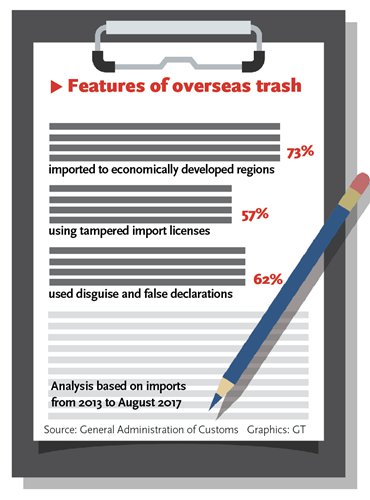
International environmental treaty provides solid ground for move
China will firmly carry out the ban on imports of such items as waste plastic and paper, and the claim that this policy breaches WTO obligations is groundless, industry representatives told the Global Times on Monday.
When it comes to global waste trade, the claim about China seeming to violate WTO obligations is groundless and hypocritical, Hua Chunying, spokeswoman of the Ministry of Foreign Affairs, told a press briefing on Monday.
"Why it is legitimate that the U.S. can curb exports of high-technology and value-added products to China while is it illegal for China to restrict imports of garbage?" she said
The U.S. claimed on Friday that China's import restrictions on recycled commodities have caused a fundamental disruption in global supply chains for scrap materials, according to Reuters.
A US official also pointed a finger at China, which seemed to be breaching its WTO obligations by treating domestic and foreign waste differently while also employing an overly trade-restrictive policy, Reuters noted.
Any country has the right to "say no" to hazardous wastes, following international treaties and adjustment of its own policies, said Zheng Tianlu, an expert with the China Plastics Processing Industry Association.
"China was the world's recycling bin for decades. While China generated huge volumes of plastic every year, the country has faced mounting pressure in recycling waste composed of plastic," he said, noting that China has to reduce dependence on imports of plastic scrap.
The State Council, China's cabinet, unveiled the ban on imports of "foreign garbage" in July 2017, with the aim of further developing the recycling industry and enhancing environmental protection. It said that as of the end of 2017, imports of trash such as plastic waste from daily use sources, unsorted waste paper and textiles would be all banned.
The Chinese government will also gradually reduce the categories of imported solid waste and further crack down on illegal trading of foreign garbage.
The U.S. is the largest exporter of major recycled commodities including plastic scrap, recovered paper, ferrous scrap and copper scrap, according to data compiled by the Institute of Scrap Recycling Industries Inc.
For instance, the country exported 2.04 million tons of plastic scrap in 2015, followed by Japan and Germany, which shipped 1.61 million tons and 1.38 million tons to overseas markets, respectively.
In spite of questions raised on China's ban on trash imports "the Chinese government will not change course," said Huo Jianguo, senior research fellow at the Center for China and Globalization.
"The recent claim by the U.S. about global waste trade aims to make trouble for China amid China-US trade war tensions," Huo said.
Under WTO rules and obligations, members can adopt trade-related measures aimed at protecting the environment, he noted. "It's fully reasonable that China is heading toward this direction in terms of environmental protection."
China saw rapid growth in its waste imports over the past two decades, which led to serious environmental pollution, Li Ganjie, Minister of Ecological Environment, told a press conference on March 17 during the two sessions.
"The government will further adjust categories of waste imports," he said, noting that the total import volume of garbage declined 12 percent last year annually and will continue to drop this year.
In October 2017, five WTO members questioned China's import ban on solid waste, particularly for certain scrap materials, at a meeting of the WTO Committee on Import Licensing, according to the WTO's website. The U.S., the EU, Australia, Canada and South Korea expressed concern that the restrictions might hurt their own industries as well as traders.
Under the Basel Convention on the Control of Transboundary Movements of Hazardous Wastes, an international treaty that allows countries to reject hazardous waste trade, China has the right to refuse foreign garbage, Wang Wang, secretary-general of the China Scrap Plastics Association, told the Global Times on Monday.
"China has taken too much responsibility for recycling trash from all over the world, and it is reasonable that it will no longer bear this responsibility, considering the damage to our environment," Wang said.
However, a one-size-fits-all import ban will raise concerns among traders, Huo noted. "While the government won't change course in forbidding foreign trash, some measures can be adopted in a more flexible way to make sure the ban will not affect production that needs recycled commodities as auxiliary materials," he said.


















































